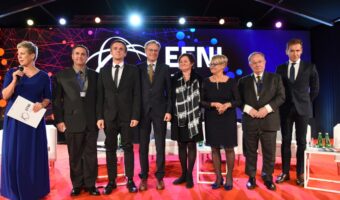The European Forum for New Ideas (EFNI) took place on 28-30 September 2016 in Sopot, Poland. The event was organised by Lewiatan, the confederation of Polish employers. Representatives of business, science, politics, trade unions and NGOs gathered together to discuss the issue of automation and robotisation, and the future of work. Keynote speakers included Guy Standing (SOAS, University of London) and Martin Ford, the futurist, author of the bestselling book Rise of the Robots: Technology and the Threat of a Jobless Future.
Undoubtedly, the fourth industrial revolution is changing (and will change) the nature of work worldwide. It raises concerns that many people who will not be able to adapt their skills and will become jobless. Piotr Lewandowski from our Institute participated, with Eszter Nova (Financial Research Institute, Hungary) and Dominykas Šumskis (Lithuanian Free Market Institute, Lithuania), in one of the debates touching upon these issues. The debate “Globalisation and the future of work in the eyes of young people – opportunity or threat?” was organised by the Liberté! magazine and moderated by Krzysztof Iszkowski (Liberté!) . Piotr Lewandowski presented the results of IBS research which show that in the Central and Eastern Europe, so far, robots and computers have not been taking over our jobs. The discussion circled around opportunities and challenges that computerisation and automation create specifically for CEE countries. The panelists stressed the challenge of balancing STEM education with soft skills, and the importance of early age education in building required skill sets.
Some sessions looked beyond the economic aspects of technological progress. The debate moderated by Radosław Markowski (University of Social Sciences and Humanities, Warsaw, Poland) and involving Stefan Batory (iTaxi, Poland), Ulrike Guérot (European Democracy Lab, Germany), Herbert Kitschelt (Duke University, USA), Ferdinand Kjaerulff (CodersTrust, Denmark), Hubert Tworzecki (Emory College of Arts and Sciences, USA) was particularly interesting as it tackled the political and social dimensions of internet, new technology and media.
The European Forum for New Ideas (EFNI) – website

r.k./pl.


